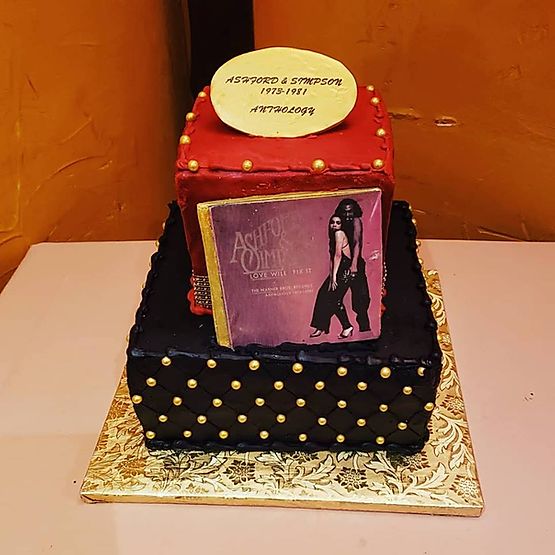
Sugar Bar's celebratory box set cake
“We gonna fix it tonight!” said Valerie Simpson, getting the Monday night party celebrating a new three-CD Ashford & Simpson box set started at Ashford & Simpson’s Sugar Bar on Manhattan’s Upper West Side.
She was talking about the dreadful late November weather—a cold rain that had tormented the city all day—while also tying in with the new compilation’s title: Ashford & Simpson: Love Will Fix It—The Warner Bros. Records Anthology 1973-1981, released by U.K. label Groove Line Records: “Love will fix it“ is a key line from “Found a Cure,” the hit from Ashford & Simpson’s 1979 album Stay Free, which appears in its original version on Love Will Fix It, together with the remix that was also included in the 2008 two-disc Rhino/Warner Bros. Ashford & Simpson compilation Hits, Remixes and Rarities: The Warner Brothers Years.
Many of the participants in those historic Warner Bros. sessions were in the house Monday night, along with current and past Ashford & Simpson band members. There were representatives, too, from Simpson and late husband/creative partner Nick Ashford’s pre-Warner Bros. Motown years (arranger Paul Riser and music contractor Sephra Herman), and even one big name who predated Motown: “Joshie” Jo Armstead, an original Ikette with the Ike & Tina Turner Revue before collaborating with Ashford and Simpson in writing such early hit compositions as “Let’s Go Get Stoned” and “I Don’t Need No Doctor.”
“How lucky Nick and I were,” said Simpson, looking out into the esteemed gathering of music people who were so integral to Ashford & Simpson--and the entire New York music community of the 1970s. “You were lifting our songs and taking them to the next level. We used each other and grew through each other. My heart is overflowing.”
She related, however, that as a major player in the highly lucrative New York jingles scene, “I was the one making all the money—stupid money. Nick said I had to make a decision: Keep making this stupid money, or take a stupid chance on what might happen [by giving up jingles and focusing on songwriting]. I had to give up that money because I felt something could happen—and I’m happy I did!”
So were many in attendance who would directly benefit from Simpson’s decision. Among those who got up to speak, though, Freddie Jackson brought the house down by revealing his grudge over not being hired as a background singer.
“The world needs to know what you did to me!” he bellowed, then recalled how he had been “a huge, huge Ashford & Simpson fan,” following them around (“okay, stalking”)—at the White Rock Baptist Church in Harlem, where the couple famously first met.
“But [Simpson’s brother and longtime Village People lead singer] Raymond Simpson got the gig!” Jackson playfully groused, then said, soberly, “The music they provided still has a place in my soul,” and as a Sugar Bar Thursday Night Open Mic regular, added, “Whenever you walk through the door here, it feels like home.”
Fonzi Thornton, who contributed an essay to the Love Will Fix It set, likewise extolled the restaurant/nightclub as “one of the only music venues in this city for our music,” and noted that Ashford and Simpson exuded class as people and songwriters whose lyrics fit their music.
Also speaking to their creative side, Tony Award-winning choreographer George Faison, who conceived the impassioned Ashford & Simpson dance routines, noted that the duo “identified” a generation with its soundtrack. Nat Adderly Jr., a former Ashford & Simpson music director, recalled how he “learned the business” from Ashford & Simpson, and how when he was studying piano in college, had to force himself to “stop listening to Ashford & Simpson” records in order to “find myself” and graduate, having discovered that everything he was playing “sounded exactly like Valerie!”
Longtime Dancing With the Stars music director Pianist Ray Chew, who took over the music director piano bench from Adderly when he was a 19-year-old young whipper-snapper (and also penned an essay for Love Will Fix It), said that when Simpson called him to see if he could work a day job, he figured it was to come over to do housework—which he happily would have done—instead of assist on the first of many Ashford & Simpson studio sessions.
Aside from such testimony, there was typical Sugar Bar hard partying, the floor filled with dancers while the sound system pounded out Ashford & Simpson classics (including “Found a Cure,” “It Seems to Hang On,” “By Way of Love’s Express” and “Nobody Knows”--all included in the box set) as if they’d originally come out that day. Caught up in it all, Simpson did manage to corral all her fellow piano players present for a photo.
And not even the one somber moment was joyless. As photos of the many late performers on the Ashford & Simpson Warner Bros. recordings were projected on an overhead screen at the stage—to the strains of the box’s lead track “(I’d Know You) Anywhere” and most prominently including Richard Tee, Cornell Dupree, Eric Gale, Ralph MacDonald, Hugh McCracken, and of course, Nick Ashford—their surviving friends lovingly shouted out their names.
Surely, as a teary Sephra Herman had noted, it was the music, and the fun, “and most of all—the friendship” that infused the Ashford & Simpson Warner Bros. recordings.
“What a rare privilege to be in the same room as so many of the arrangers, musicians, and vocalists who created this timeless music with Nick and Val,” marveled Christian John Wikane, the liner note writer of Ashford & Simpson: Love Will Fix It—The Warner Bros. Records Anthology 1973-1981.
“I’m dazzled by the love vibe in the room,” added Liz Rosenberg, Ashford & Simpson’s publicist during their Warner Bros. period, whom Simpson had specially singled out.
But as the song and dance continued, it was clear that a celebration of the past had carried well into the present.
Recent Posts
Archive
Tags
Related posts








